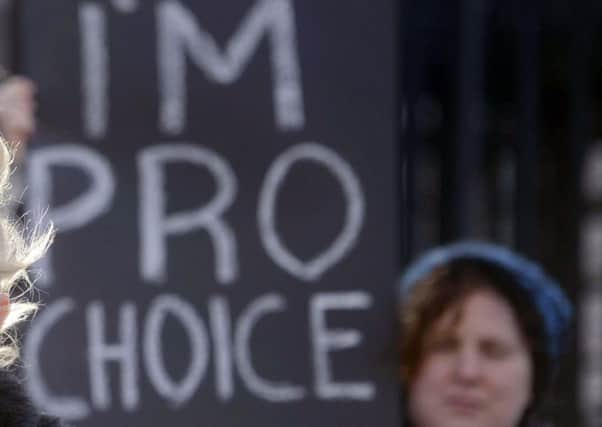‘Traumatised women and girls forced to cross the Irish Sea’ for pregnancy terminations


Amid claims that the current near-blanket ban is inhuman and discriminatory, a judge was also told it would be wrong to wait for Stormont to make uncertain legislative changes.
The Northern Ireland Human Rights Commission is taking legal action in a bid to have terminations legalised in cases of rape, incest or serious foetal malformation.
Advertisement
Hide AdAdvertisement
Hide AdUnlike other parts of the UK, abortions are currently only legal in Northern Ireland to protect the woman’s life or if there is a risk of permanent and serious damage to her mental or physical health.
Judicial review proceedings were issued after the Department of Justice launched a public consultation on amending the criminal law.
It has concluded with a recommendation for new legislation dealing with cases of fatal foetal abnormality.
But with no proposed changes covering pregnancies resulting from sexual crime, the Commission claims the consultation does not go far enough.
Advertisement
Hide AdAdvertisement
Hide AdCounsel for the body argued today that the situation is incompatible with the European Convention on Human Rights.
Entitlements to freedom from torture and inhuman and degrading treatment, privacy, and freedom from discrimination are all being violated, it was claimed.
An expected three-day legal battle is also set to hear submissions by Attorney General John Larkin QC, the Catholic Bishops in Northern Ireland, and Sarah Ewart - a woman from Northern Ireland who went to England for an abortion after learning her unborn baby had no chance of survival.
Opening the case on behalf of the Commission, Nathalie Lieven QC rejected claims that laws on termination of pregnancies are for politicians to deal with.
Advertisement
Hide AdAdvertisement
Hide AdShe told Mr Justice Horner: “The respondent and the Attorney General argue this is a matter which should simply be left to the Executive, and they do to some degree rely on the fact that there has been a consultation process on changing the law on abortion.
“That argument is completely misconceived for a whole host of reasons.
“It’s simply wrong in principle - there’s a duty on the court to consider the question of compatibility, and the court cannot defer that consideration in the hope or expectation that the Executive might change the law at some unknown date in the future.”
Such a situation would be contrary to the fundamentals of the European Convention, she contended.
Advertisement
Hide AdAdvertisement
Hide AdMs Lieven insisted that the Commission itself does not require victim status to bring court challenge.
Instead, she submitted: “There can be no possible doubt on the facts of this case that there will be a large number of victims (of these provisions).”
She cited figures showing 802 women and girls from Northern Ireland travelled to England and Wales for abortions in 2013.
Five of those were aged under 16, the court heard. Two years earlier 19 girls in that age group made the trip.
Advertisement
Hide AdAdvertisement
Hide Ad“There’s serious reason to believe (the figures) may be significantly under-reported,” the barrister added.
She suggested many of those travelling from Northern Ireland may be giving English addresses.
The court was told a large number of the cases fall into one of the three categories at the centre of the case - rapes, incest or serious foetal abnormality.
With statements supplied by Ms Ewart and others backing the Commission’s case, Ms Lieven said: “Those cases cited in the affidavits show the extreme psychological trauma of the situation faced by individual women and girls.”
The hearing continues.